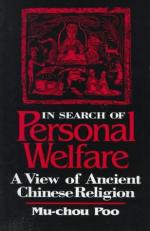|
This section contains 2,004 words (approx. 7 pages at 300 words per page) |

|
Systematic argument in Chinese philosophy began with the Moist school, founded in the fifth century BCE by the first anti-Confucian thinker, Mozi (c. 470–c. 391 BCE). He laid down three tests for the validity of a doctrine: ancient authority, common observation, and practical effect. At first the controversies of the various schools over moral and political principles led to increasing rigor in argument; then to an interest in dialectic for its own sake, as evidenced in Hui Shih's paradoxes of infinity and in Kung-sun Lung's sophism "A (white) horse is not a horse"; and still later to the antirationalism of the Daoist Zhuangzi (born c. 369 BCE), who rejected all dialectic on the grounds that names have only an arbitrary connection with objects and that any point of view is right for those who accept the choice of names it assumes.
Logic of Moism
In the third century...
|
This section contains 2,004 words (approx. 7 pages at 300 words per page) |

|


